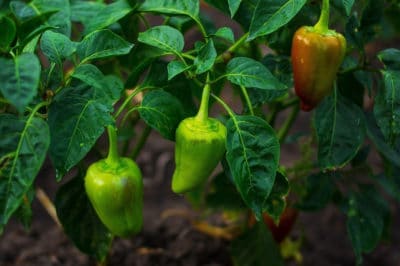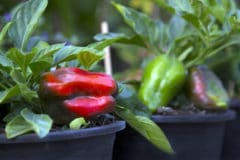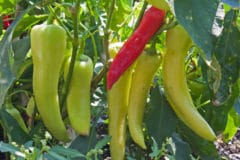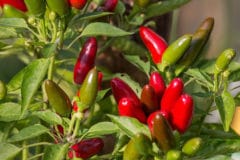Fertilizing Peppers
Peppers are sensative to heavy fertilizers, particularly salt-based, and those with ammonia-based nitrogen. These products can burn a plant and even cause it to drop blossoms or small fruit.
These spicy fruits do like a good feeding. The best time to work in a fertilizer is when you first transplant them outside, and then again after they begin to set fruit. Work a good compost, worm castings, manure, or a 5-10-10 fertilizer into the transplant hole and surrounding area.
When the plant has small fruits another dose of nutrients may help it produce higher quality peppers. You can brew a compost tea and water it into the base of the plant, or mulch the plant with a 2-inch layer of compost.
Compost
Good organic compost serves the purpose of inoculating the soil with living beneficial microbes and organic matter to feed them. This living soil ecosystem actively delivers plant available nutrients to the roots of your plants. Compost can be purchased at garden supply stores but making it yourself will create a superior product.
Use any number of items to build a compost pile. Layer each element onto the pile to create many thin layers alternating between green and brown material. Wet with a hose in between layers.
Green Material
- Kitchen Scraps
- Fresh Grass Clippings
- Green Garden or Landscaping Waste
Brown Material
- Old straw or grass clippings
- Raked Leaves
- Shredded Paper
This type of pile does not need turning and should compost within 3 months. Ammend pepper beds with 3-4 inches of compost laid on top or forked into the soil.
Other Organic Fertilizers
Worm castings are a safe and nutrient rich way to fertilize pepper plants. Because they are mild they don’t run the risk of burning the plant or causing stress. You can purchase worm castings in a liquid form if it’s easier handling for you.
Manures are widely available from local equine facilities or farms. These are good soil amendments but should be aged 3-9 months before being applied to the soil. Using manures also increases your risk of harmful pathogens potentially present on the fruits. Since peppers are often consumed raw, utmost care should be taken when applying this type of fertilizer.
The most accurate way to determine how to amend your soil and what your plants may be lacking is to have it tested.












